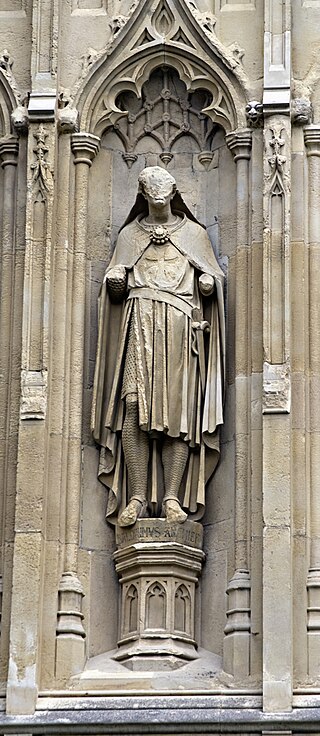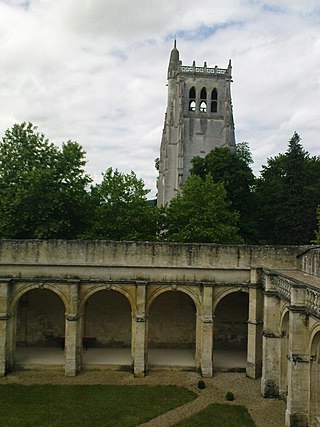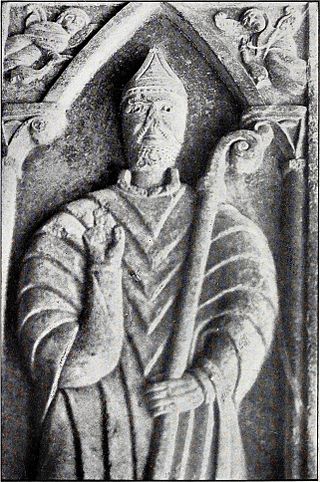William de Corbeil or William of Corbeil was a medieval Archbishop of Canterbury. Very little is known of William's early life or his family, except that he was born at Corbeil, south of Paris, and that he had two brothers. Educated as a theologian, he taught briefly before serving the bishops of Durham and London as a clerk and subsequently becoming an Augustinian canon. William was elected to the See of Canterbury as a compromise candidate in 1123, the first canon to become an English archbishop. He succeeded Ralph d'Escures who had employed him as a chaplain.
John de Gray or de Grey was an English prelate who served as Bishop of Norwich, and was elected but unconfirmed Archbishop of Canterbury. He was employed in the service of Prince John even before John became king, for which he was rewarded with a number of ecclesiastical offices, culminating in his pro forma election to Norwich in 1200. De Gray continued in royal service after his elevation to the episcopate, lending the King money and undertaking diplomatic missions on his behalf. In 1205 King John attempted to further reward de Gray with a translation to the archbishopric of Canterbury, but a disputed election process led to de Gray's selection being quashed by Pope Innocent III in 1206.
Ralph d'Escures was a medieval abbot of Séez, bishop of Rochester, and then archbishop of Canterbury. He studied at the school at the Abbey of Bec. In 1079 he entered the abbey of St Martin at Séez and became abbot there in 1091. He was a friend of both Archbishop Anselm of Canterbury and Bishop Gundulf of Rochester, whose see, or bishopric, he took over on Gundulf's death.
Richard was a medieval Benedictine monk and Archbishop of Canterbury. Employed by Thomas Becket immediately before Becket's death, Richard arranged for Becket to be buried in Canterbury Cathedral and eventually succeeded Becket at Canterbury in a contentious election. Much of Richard's time as archbishop was spent in a dispute with Roger de Pont L'Evêque, the Archbishop of York over the primacy of England, and with St Augustine's Abbey in Canterbury over the archbishop's jurisdiction over the abbey. Richard had better relations with King Henry II of England than Becket had, and was employed by the king on diplomatic affairs. Richard also had the trust of the papacy, and served as a judge for the papacy. Several of his questions to Pope Alexander III were collected into the Decretals, a collection of ecclesiastical laws, and his patronage of canon lawyers did much to advance the study of canon law in England.
Eustace was the twenty-third Lord Chancellor of England, from 1197 to 1198. He was also Dean of Salisbury and Bishop of Ely.
Sigeric was the Archbishop of Canterbury from 990 to 994. Educated at Glastonbury Abbey, he became a monk there before becoming an abbot and then Bishop of Ramsbury before his elevation to the archbishopric. An account of his pilgrimage to Rome in 990 survives and is an important source for historians studying Rome during his lifetime.

Roger de Pont L'Évêque was Archbishop of York from 1154 to 1181. Born in Normandy, he preceded Thomas Becket as Archdeacon of Canterbury, and together with Becket served Theobald of Bec while Theobald was Archbishop of Canterbury. While in Theobald's service, Roger was alleged to have committed a crime which Becket helped to cover up. Roger succeeded William FitzHerbert as archbishop in 1154, and while at York rebuilt York Minster, which had been damaged by fire.
Ælfric Puttoc was Archbishop of York from 1023 to his death, and briefly Bishop of Worcester from 1040 to 1041. He may have crowned Harold Harefoot in 1036, and certainly assisted in that king's disinterment in 1040 and at the coronation of Edward the Confessor in 1043. He founded houses of canons and encouraged the cult of John of Beverley.

Cynesige was a medieval English Archbishop of York between 1051 and 1060. Prior to his appointment to York, he was a royal clerk and perhaps a monk at Peterborough. As archbishop, he built and adorned his cathedral as well as other churches, and was active in consecrating bishops. After his death in 1060, the bequests he had made to a monastery were confiscated by the queen.
Henry Murdac was abbot of Fountains Abbey and Archbishop of York in medieval England.

Baldwin of Forde or Ford was Archbishop of Canterbury between 1185 and 1190. The son of a clergyman, he studied canon law and theology at Bologna and was tutor to Pope Eugene III's nephew before returning to England to serve successive bishops of Exeter. After becoming a Cistercian monk he was named abbot of his monastery at Forde and subsequently elected to the episcopate at Worcester. Before becoming a bishop, he wrote theological works and sermons, some of which have survived.

Reginald Fitz Jocelin was a medieval Bishop of Bath and an Archbishop of Canterbury-elect in England. A member of an Anglo-Norman noble family, he was the son of a bishop, and was educated in Italy. He was a household clerk for Thomas Becket, but by 1167 he was serving King Henry II of England. He was also a favourite of King Louis VII of France, who had him appointed abbot of the Abbey of Corbeil. After Reginald angered Becket while attempting to help negotiate a settlement between Becket and the king, Becket called him "that offspring of fornication, that enemy to the peace of the Church, that traitor." When he was elected as a bishop, the election was challenged by King Henry's eldest son, Henry the Young King, and Reginald was forced to go to Rome to be confirmed by Pope Alexander III. He attended the Third Lateran Council in 1179, and spent much of his time administering his diocese. He was elected Archbishop of Canterbury in 1191, but died before he could be installed.
Gerard la Pucelle was a peripatetic Anglo-French scholar of canon law, clerk, and Bishop of Coventry.
Ælfric of Abingdon was a late 10th-century Archbishop of Canterbury. He previously held the offices of abbot of St Albans Abbey and Bishop of Ramsbury, as well as likely being the abbot of Abingdon Abbey. After his election to Canterbury, he continued to hold the bishopric of Ramsbury along with the archbishopric of Canterbury until his death in 1005. Ælfric may have altered the composition of Canterbury's cathedral chapter by changing the clergy serving in the cathedral from secular clergy to monks. In his will he left a ship to King Æthelred II of England as well as more ships to other legatees.
Duduc was a medieval Bishop of Wells.
Leofwin was a medieval Bishop of Lichfield.
Robert de Limesey was a medieval cleric. He became Bishop of Chester in 1085, then his title changed to Bishop of Coventry when the see was moved in 1102.
Richard Peche was a medieval Bishop of Lichfield.

Hugh Nonant was a medieval Bishop of Coventry in England. A great-nephew and nephew of two Bishops of Lisieux, he held the office of archdeacon in that diocese before serving successively Thomas Becket, the Archbishop of Canterbury and King Henry II of England. Diplomatic successes earned him the nomination to Coventry, but diplomatic missions after his elevation led to a long delay before he was consecrated. After King Henry's death, Nonant served Henry's son, King Richard I, who rewarded him with the office of sheriff in three counties. Nonant replaced his monastic cathedral chapter with secular clergy, and attempted to persuade his fellow bishops to do the same, but was unsuccessful. When King Richard was captured and held for ransom, Nonant supported Prince John's efforts to seize power in England, but had to purchase Richard's favour when the king returned.

Bartholomew of Exeter was a medieval Bishop of Exeter. He came from Normandy and after being a clerk of the Archbishop of Canterbury, was made Archdeacon of Exeter in 1155. He became Bishop of Exeter in 1161. Known for his knowledge of canon law, he was involved in the Becket controversy after the appointment of Thomas Becket as Archbishop of Canterbury. After Becket's death, although he was frequently at the royal court, he mainly attended to his diocese. A number of works by him survive, including sermons and treatises on law and theology.






